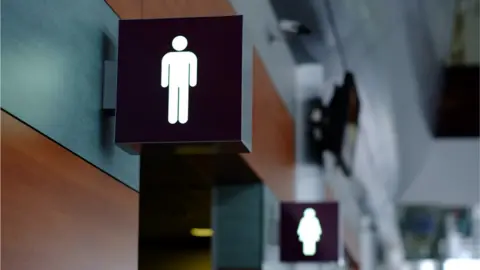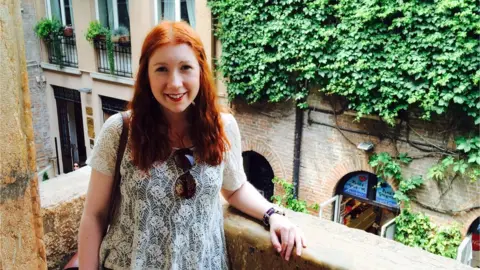Two female loos for every male one, experts recommend
 Getty Images
Getty ImagesPublic health experts are calling for fair provision of public toilets for women, saying the aim should be to have two female loos to every male one.
With more urinals than cubicles, men - unlike women - rarely queue, a Royal Society for Public Health report says.
It blames the closure of hundreds of council-run toilets for deterring some people from leaving the house.
The government said it was down to councils to manage their resources and provide necessary services for people.
The Royal Society's report says that people with health problems or a disability are most affected by the lack of public conveniences.
It adds that public toilets "should be considered as essential as streetlights, roads and waste collection".
But it said the lack of facilities in the UK was affecting equality, mobility, fitness and other aspects of health - yet no-one wanted to pay for them.
In a survey of more than 2,000 adults for the report, two in five people with a medical condition requiring frequent trips to the toilet, said they didn't feel able to go out as often as they wanted because of "loo leash".
In some US states and Canada, attempts have been made to introduce "potty parity" legislation to reflect the longer amount of time women need when using the toilet.
'I could need the toilet very quickly'
 BBC News
BBC NewsLorna Goudie, a 31-year-old library assistant based in Liverpool, has had irritable bowel syndrome (IBS) for 10 years.
"If I go somewhere unfamiliar I can get quite stressed about where the toilets are and how quickly I can get to them," she says.
"In a way it is like you are recovering from an upset stomach but are not quite sure if you are fully better, so you could need the toilet very quickly - for some people it can be like that all the time.
"So for example, I love the countryside and have friends who invite me on long walks, but I don't go because I don't like being far from the city."
Lorna runs a local support group for people with IBS and says the issue comes up frequently.
"It is getting very trendy at the moment to turn toilets into bars, but the fact is people really need them - whether you have IBS or not."
Urinals v cubicles
A BBC map of public toilet provision in 2018 found there were 4,486 run by major councils in the UK, down from 5,159 in 2010.
And in 37 council areas, there were no public toilets provided at all.
The report said this was leading to people "holding it in" or urinating in the streets, which is unhygienic and could lead to illness from contamination.
The standard ratio of female to male toilets in the UK is 1:1 but because of higher numbers of urinals in male toilets, this is rarely achieved, the Royal Society says.
 Getty Images
Getty ImagesThe report said equality of access to toilets was also important for transgender people.
A spokesperson for the Local Government Association said: "Councils are doing everything they can to keep public toilets open, and this includes running community toilet schemes, which enable local businesses like pubs, restaurants and shops to make more clean, safe and accessible toilets available to the public.
"Faced with an £8bn funding gap by 2025 and growing demand pressures on adult social care, children's services and homelessness support, councils have had to make tough choices about how to manage dwindling resources."
A government spokeswoman said public toilets were "a valuable community amenity".
"Councils, not central government, are responsible for managing their own resources and providing the local services people need, including public toilets."
